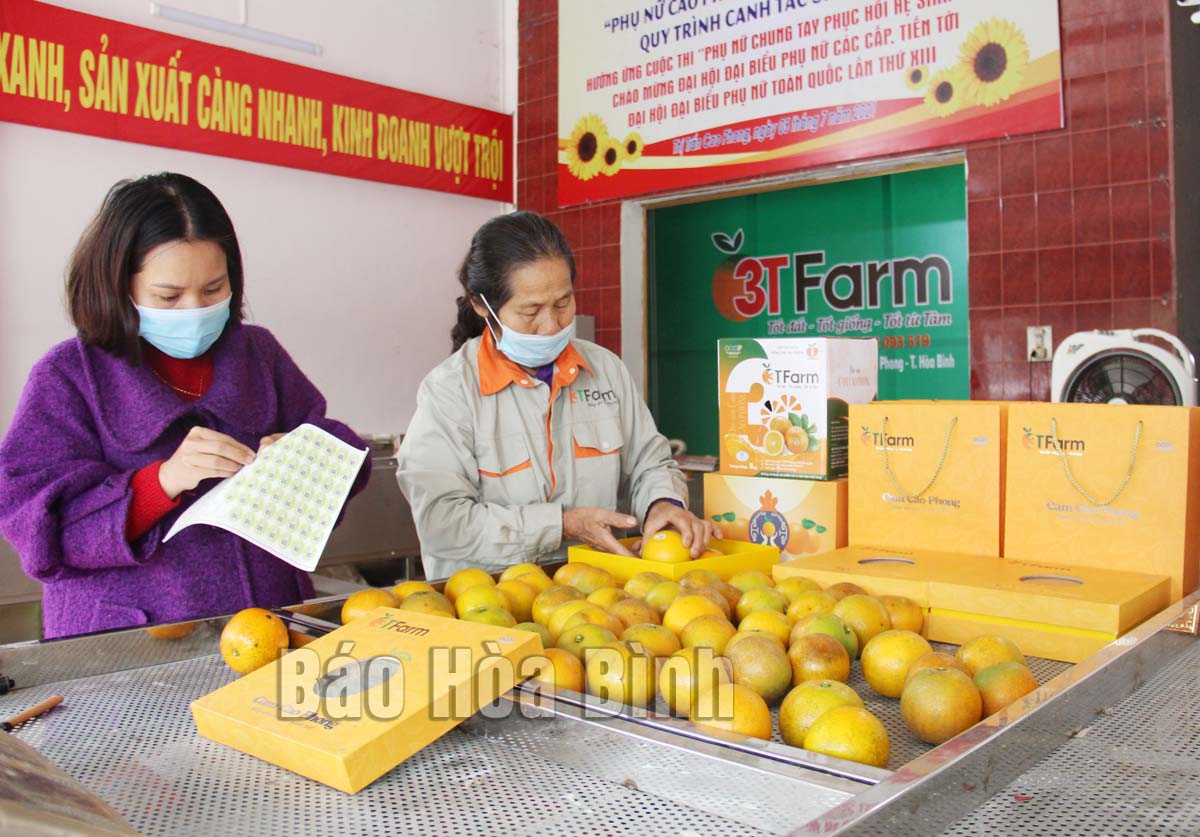
(HBO) – In a bid to step up the local "One Commune One Product (OCOP)” programme, authorities at all levels in Cao Phong district have actively run communication campaigns, complied dossiers, and rated OCOP products since 2019, hence an increase in production value and people’s incomes.

OCOP oranges for luxury gifts of the 3T Cao Phong
agricultural cooperative are certified with four stars.
Currently, the district has eight OCOP products, including
four-star rated ones like fermented orange juice and oranges by the Ha Phong
cooperative, and luxury orange gifts by the 3T Cao Phong agricultural
cooperative, as well as three-star rated ones like orange juice and wine by the
Ha Phong cooperative, among others.
Vu Thi Le Thuy, Director of the 3T Cao Phong agricultural
cooperative said the production and harvest of its VietGAP-certificated oranges
comply with strict technical regulations. To enhance the fruit’s value added,
the cooperative has launched its high-class OCOP gift product, which is
associated with an organic production chain for a green living environment. The
product got a 3-star ranking in 2019, and was upgraded to 4 stars in 2020.
Bui Van Dan, Head of the Cao Phong Department of Agriculture
and Rural Development, said the Ha Phong and Cao Phong cooperatives produce
seven out of the district’s eight OCOP products, reflecting the leading role of
the cooperative model in the local OCOP programme.
Currently, the local People’s Committee has built a plan for
OCOP products development for 2021 – 2025, which will see up to two new
products developed. During the period, relevant agencies will coordinate to
improve the local production capacity and product quality as well as promote
communications and trade activities./.
Hoa Binh province is undergoing a dynamic transformation amid Vietnam’s national digital transition. Building on Poliburo’s Resolution No. 57-NQ/TW on breakthroughs in science, technology, innovation, and national digital transformation, the province has rolled out a wide range of practical action plans. A standout initiative is the "Digital Literacy for All” movement, an effort to ensure that no one is left behind in the digital era.
Hoa Binh province is undergoing a dynamic transformation in the wake of the national digital transformation movement. Building on Resolution No. 57-NQ/TW of the Politburo on breakthroughs in science, technology, innovation, and national digital transformation, the province has implemented a wide range of practical action plans. A standout initiative is the "Digital Literacy for All” movement ambitious effort to ensure that no one is left behind in the digital age.
With a spirit of unity and proactive problem-solving, the Party Committee, the government and the people of Dong Lai Commune (Tan Lac District) have made great strides in implementing the resolutions of the 24th Party Congress of the commune for the 2020 - 2025 term. Focusing on leadership and practical actions, the commune has brought the Party’s resolutions into daily life, creating strong impacts and pushing the local development forward.
Amid the nationwide push for digital transformation, young people in Hoa Binh Province are stepping up as dynamic pioneers, applying technology to enhance Youth Union operations and expand the reach of youth-led initiatives. Through creativity and adaptability, Youth Union organizations at all levels have introduced a series of practical solutions, contributing to modern governance and community development.
In recent years, An Nghia commune, located in Lac Son district, has stepped up administrative reform, focusing on improving the quality and efficiency of its single-window service unit for receiving and processing administrative procedures. These improvements have helped create favourable conditions for local residents and organisations to handle administrative procedures, contributing to the commune’s broader socio-economic development.
The Prime Minister-approved master plan to develop the multi-use value of forests ecosystems through 2030, with a vision to 2050, aims to improve the management and sustainable use of forest resources, create jobs, increase incomes, and improve the living standards of ethnic minorities, people in mountainous and remote areas, forest workers and those living near forests.



